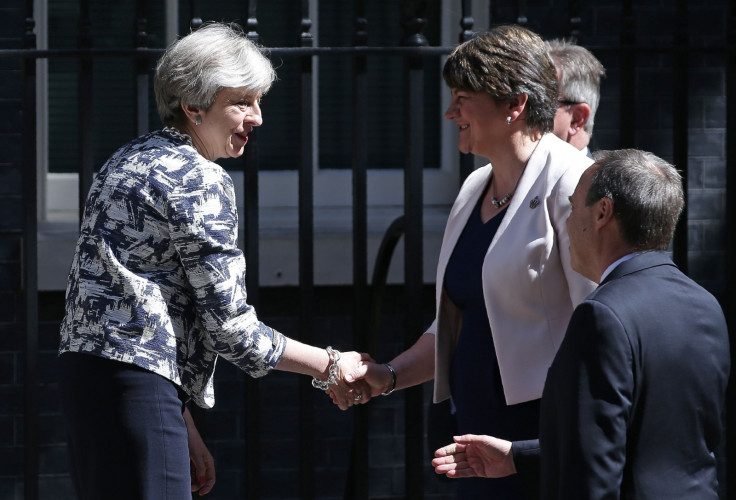£1bn Tory/DUP deal condemned as 'outrageous bung to keep weak PM'
Theresa May attacked for striking alliance with Northern Ireland party to form minority government
The £1bn deal struck by the DUP to support a minority Conservative government has been criticised as "outrageous" and an "obscene insult" by MPs from opposing parties.
Theresa May confirmed that a confidence and supply deal has been agreed between the government and Arlene Foster's party, which will see the £1bn funding package over the next two years as well as a "new flexibilities" on almost £500m previously committed to Northern Ireland.
As part of the deal, the DUP has agreed to support the Tories in any crucial votes in the House of Commons in return for funding including £400m for infrastructure, £200m for improvement of the health service and £150m for ultra-fast broadband in Northern Ireland.
The government also agreed to drop triple lock pension reforms – as proposed in their manifesto – as well as keepinh the winter fuel allowance as part of the deal with the DUP.
Carwyn Jones, the first minister for Wales, was one of those to criticise the deal, describing the money offered to the DUP as a "straight bung to keep a weak prime minister and a faltering government in office".
Jones said: "Only last week we were told that the priority was to 'build a more united country, strengthening the social, economic and cultural bonds between England, Northern Ireland, Scotland and Wales.' This deal flies in the face of that commitment and further weakens the UK and, as currently drafted all but kills the idea of fair funding for the nations and regions.
Jones added the deal is a "short-term fix which will have far-reaching and destabilising consequences".
Labour leader Jeremy Corbyn said there are two questions the government must answer following the DUP deal: "Where is the money for the Tory-DUP deal coming from? And, will all parts of the UK receive the much needed additional funding that Northern Ireland will get as part of the deal?"
Corbyn added: "This Tory-DUP deal is clearly not in the national interest but in May's party's interest to help her cling to power."

Plaid Cymru's Westminster leader Liz Saville Roberts also believes if the prime minister can offer this deal to the DUP similar commitments must must be made with Wales
Roberts added: "If reports that the DUP has secured a £1bn increase in public spending in Northern Ireland are realised, Wales' population share would be around £1.7bn – a substantial boost to the Welsh economy that must be delivered."
Elsewhere, outgoing Lib Dem leader Tim Farron said the public "will not be duped by this shoddy little deal". He told the BBC: "While our schools are crumbling and our NHS is in crisis, Theresa May chooses to throw cash at ten MPs in a grubby attempt to keep her cabinet squatting in Number 10."
Others MPs expresses similar concerns about the deal on social media.
Hmm. No change to Winter Fuel Payments, Triple-Lock Pensions & LongTerm care. With this manifesto, we could have had a stonking majority!
— Grant Shapps MP (@grantshapps) June 26, 2017
Will the UK Government now match the Scottish Government's city deal investment in Aberdeen&Shire? £254 million less from UK Gov currently. https://t.co/32cnDY9gbd
— Kirsty Blackman (@KirstySNP) June 26, 2017
After seven years of savage cuts in spending, the Tories find £1 billion to keep themselves in office (for now): https://t.co/NfyH87gdUV
— Nick Thomas-Symonds (@NickTorfaenMP) June 26, 2017
£1.5 billion extra for Northern Ireland as a bribe to keep the Tories in power is an obscene insult to my constituents suffering austerity
— Justin Madders MP (@justinmadders) June 26, 2017
10 Birmingham MPs should be entitled to this billion pound offer, it's our citizens who are paying for it as usual https://t.co/TByUW7XEIZ
— Jess Phillips (@jessphillips) June 26, 2017
The prime minister was previously urged not to strike a deal with the DUP due to concerns about their stances on issues such as gay rights and abortion.
Major of London Sadiq Kahn said he feels "deeply uncomfortable" about the idea of the DUP playing "any role whatsoever" in propping up a minority Tory government.
He added: "The Prime Minister must make a crystal-clear statement that she rejects the illiberal and intolerant social views of the DUP and give a cast-iron guarantee that LGBT rights and women's rights will not stall or go backwards at the expense of her staying in power."
Following confirmation of the deal, May said: "I welcome this agreement which will enable us to work together in the interest of the whole United Kingdom, give us the certainty we require as we embark on our departure from the European Union, and help us build a stronger and fairer society at home. In the interests of transparency, the full terms of this agreement have been published.
"Time is running short for the parties to come together and reach agreement to re-establish a power-sharing executive by 29 June. I hope the parties will look beyond their differences and come together with a shared sense of common purpose to serve all communities in the best interests of Northern Ireland. Northern Ireland needs a functioning devolved government at this important time.
Foster added that the deal is "good for the United Kingdom, good for Northern Ireland and allows our nation to move forward to tackle the challenges ahead".
© Copyright IBTimes 2025. All rights reserved.






















